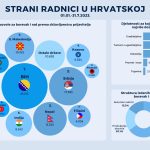ZAGREB, October 22, 2019 – The European Commission assessed on Tuesday that Croatia met the conditions for joining the Schengen Area and asked the Council of the EU to include Croatia in the area without internal border controls.
“The European Commission considers that, based on the results of the Schengen evaluation process initiated in 2016, Croatia has taken the measures needed to ensure that the necessary conditions for the full application of the Schengen rules and standards are met,” a press release said.
“Croatia will need to continue working on the implementation of all ongoing actions, in particular its management of the external borders, to ensure that these conditions continue to be met. The Commission also today confirms that Croatia continues to fulfil the commitments, linked to the Schengen rules, that it undertook in the accession negotiations,” the press release said.
Commission President Jean-Claude Juncker said: “I commend Croatia for its efforts and perseverance to meet all the necessary conditions to join Schengen… This is why I trust that Member States will take the right steps for Croatia to become a full Schengen member soon.”
Commissioner for Migration, Home Affairs and Citizenship Dimitris Avramopoulos said: “Schengen is one of the greatest and most tangible achievements of European integration. But its strength very much depends on its inclusiveness – now that Croatia has taken the measures to ensure that the necessary conditions are met, we must recognise this. Once it becomes a full member, it will contribute to further strengthening the area and ensure that the EU’s external borders are better protected.”
In order to join Schengen, a country must prove that it can assume responsibility for controlling the EU’s external borders on behalf of the other member states of the area and issue short sojourn visas, efficiently cooperate with the security authorities of the member states, and apply the Schengen rules such as control of external land, sea and air borders (airports), issuing of visas, police cooperation, protection of personal data, and the need to connect to and use the Schengen Information System and the Visa Information System.
Regular evaluations are conducted in Schengen member states to check if the Schengen rules are applied correctly.
The Commission’s evaluation on technical preparedness is not enough for joining but it is a prerequisite for the member states to make a political decision on the accession.
Bulgaria and Romania, for instance, have had a positive evaluation since 2011 but have still not joined Schengen because there is no consensus among the member states.
Slovenia has made it clear that it is going to block Croatia’s accession to the Schengen Area due to Ljubljana’s dissatisfaction with the unresolved border dispute with its eastern neighbour.
Currently, the Schengen Area includes 26 European countries that have officially abolished all passport and other types of border control at their mutual borders. Of those 26 members, 22 are part of the European Union: Austria, Belgium, the Czech Republic, Denmark, Estonia, Finland, France, Germany, Greece, Hungary, Italy, Latvia, Lithuania, Luxembourg, Malta, Netherlands, Poland, Portugal, Slovakia, Slovenia, Spain, and Sweden.
The non-EU members covered by this passport-free area are Iceland, Lichtenstein, Norway and Switzerland.
The six EU member states not included in the Schengen Area are Ireland and United Kingdom, which still maintain opt-outs, and Romania, Bulgaria, Croatia, and Cyprus, which are required to and are seeking to join soon.
Three European microstates that are not members of the European Union but which are enclaves or semi-enclave within an EU member state – Monaco, San Marino, and Vatican City – are de facto part of the Schengen Area.
Prime Minister Andrej Plenković said on Tuesday the European Commission’s decision that Croatia met the conditions to join the Schengen Area was another big European success for Croatia, but did not say when he expected Croatia to join.
“This is an important day and yet another big European success for Croatia,” he told reporters. “In the technical sense, today we received objective verification, by the only institution in charge, that we are prepared.”
Asked when Croatia would join, Plenković said he “wouldn’t speculate on a precise date” but that “it’s not realistic” that Croatia will join during its EU presidency in the first half of 2020.
As for Slovenia’s possible blockade of Croatia’s accession, he said the border dispute with Slovenia was “bilateral in nature.”
“We will try to separate those bilateral topics from this one because this is a topic we should resolve with Slovenia in a different way, through dialogue and by looking for a solution with which both sides will be satisfied.”
He said it was a success that Croatia did not have an additional monitoring mechanism for joining Schengen such as Romania and Bulgaria had.
More news about Croatia and the Schengen Area can be found in the Politics section.







